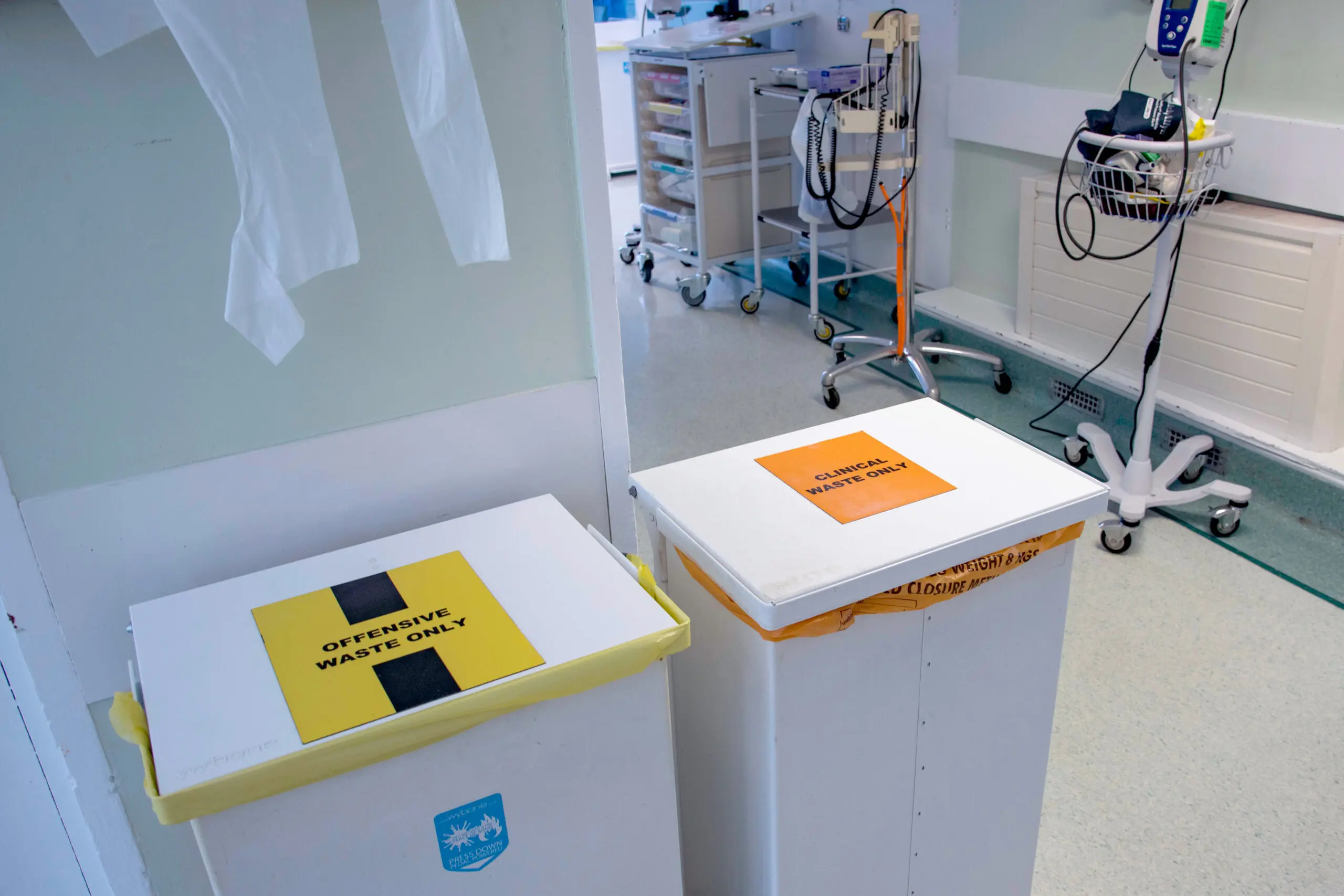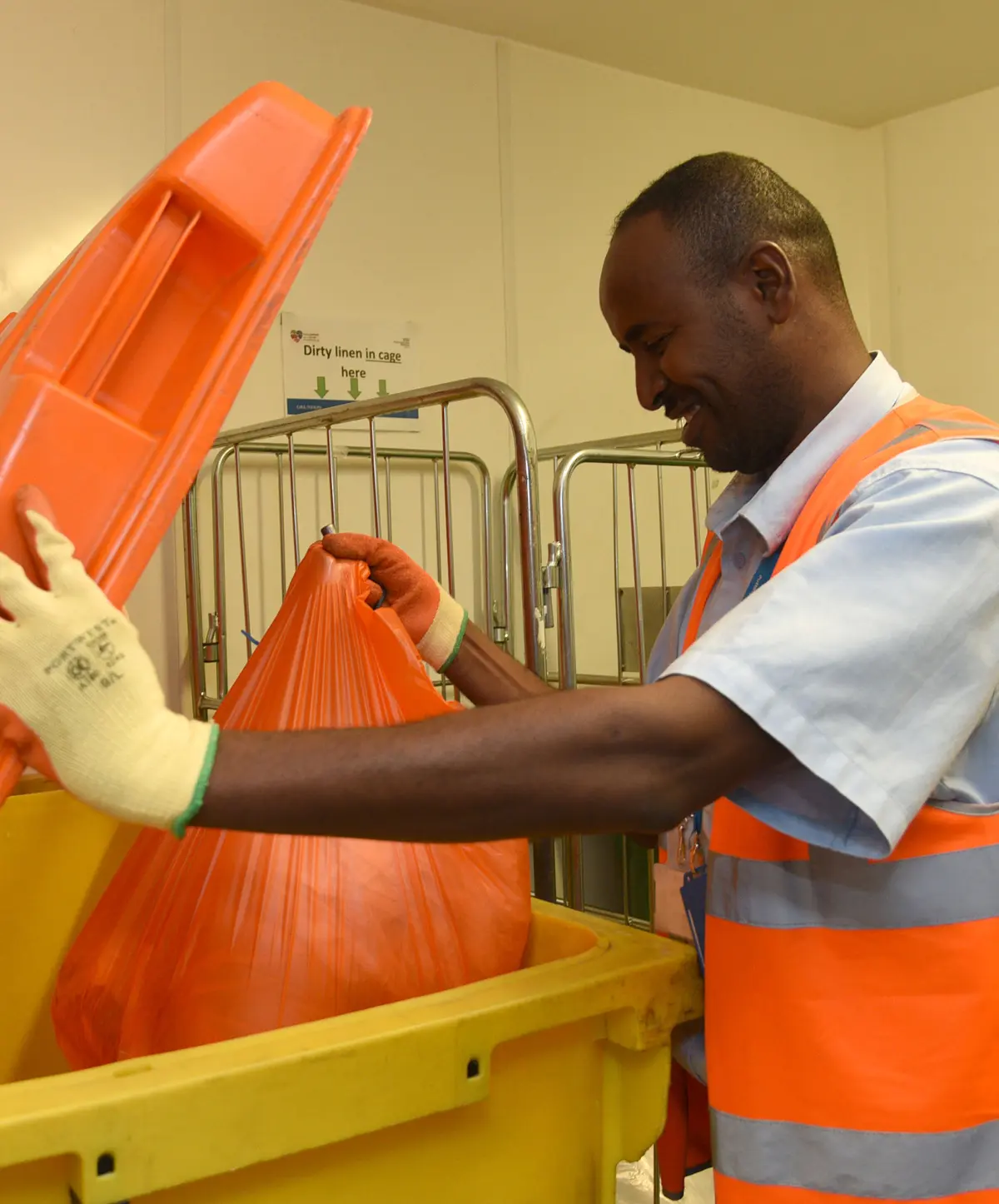Clinical Waste Collection, Recycling & Disposal
- For all clinical and offensive waste streams
- 100% compliance guaranteed
- Get expert advice
Get a quote
Are you aware of healthcare waste management legislation?
Compliance with Environmental and Health and Safety legislation is of utmost importance for clinical waste disposal. Clinical waste must be handled correctly by a permitted waste management provider to ensure the waste is managed appropriately, avoiding the risk of substantial fines and safeguarding your company’s reputation.
At Grundon, we manage every aspect of the process and guarantee full compliance. Our industry-leading facilities ensure secure segregation, traceability and disposal of a comprehensive range of clinical waste. We’re dedicated to reducing CO2 emissions and helping customers achieve their environmental goals by working closely with you to develop innovative solutions.
Ensure safe, compliant clinical waste disposal with tailored, flexible collections
Every healthcare and laboratory facility generates clinical waste. At Grundon, we process all types of clinical and offensive waste, including:
- Sharps waste
- Pharmaceutical waste
- Anatomical waste
- Cytotoxic and cytostatic waste
- Clinical plastics
- Chemical waste
- Infectious waste
- Offensive waste
- Inhalers
Our clinical waste management service is reliable, cost-effective, and fully compliant with regulations. Our flexible and cost-effective collections are tailored to meet your specific requirements. We are relied upon by the NHS, research institutions, local authorities, healthcare facilities and more.
Full compliance
We ensure that you and your business are fully compliant with all clinical waste legislation
Safe disposal at leading treatment facilities
We recycle and recover clinical waste using industry-leading technology at our own treatment facilities
CarbonNeutral® collections
Our own fleet of specialist collection vehicles, driven by ADR (Carriage of Dangerous Goods Certified) trained drivers, will not add to your carbon footprint
Zero waste to landfill
Our network of treatment facilities enables us to divert 100% of your clinical and offensive waste from landfill
Trusted by over 15,000 businesses




We understand the importance of disposing of clinical waste correctly
Navigating UK waste legislation can be a demanding and time-consuming task. That why it’s important to partner with a reliable waste provider to ensure safe, compliant disposal of clinical waste and avoid the risks of non-compliance, including hefty fines and reputational damage.
Our team of experts are here to guide you through the complexities, from quote to collection, ensuring you remain fully compliant at all times, removing the hassle and ensuring a cost-effective solution. Our award-winning clinical waste service is backed by 90 years of expertise and trusted by the NHS and leading institutions. We work closely with healthcare professionals to enhance efficiency and achieve sustainability targets outlined in the new NHS Clinical Waste Strategy.
Our pre-acceptance audit process helps identify the best solution for your clinical waste, identifying opportunities to make use of the offensive waste stream. Our in-house treatment options include High Temperature Energy Recovery Incineration and Energy from Waste, enabling us to provide services and solutions at cost-effective prices.
Enhance carbon savings with our innovative Inhaler Recycling Service and Reusable Sharps Container service. Contact our expert team today for safe, compliant disposal and complete peace of mind.
Tell us about your clinical waste and we’ll provide you with a bespoke quote
We’ll schedule your collections, provide expert classification, and safe compliant disposal
Your business remains fully compliant with clear documentation and ongoing support

Arrange your clinical waste collection with Grundon today
Who regulates the disposal of clinical waste?
The Environment Agency is the regulating authority for the safe management of clinical waste, providing the key principles relating to correct segregation, storage and disposal of waste. The main legislation relating to clinical waste is the Environment Protection Act 1990, which states that all producers of waste have a Duty of Care to ensure the correct management of the waste, ensuring that it is handled correctly.
Why do I need a specialist clinical waste management company to handle my waste and how do I know what you’ve done with it?
The challenges of staying compliant with all the necessary legislation are numerous and time-consuming. Working with a reputable and expert clinical waste management team of professionals ensures absolute compliance and can also help you achieve environmental goals, such as diverting waste away from landfill and reducing your carbon footprint.
We will provide the necessary reporting data and documentation for you to be able to prove correct compliance and full traceability and security. We keep accurate records and our customers find it valuable to track the progress of improvements, including increased offensive waste and reduced carbon footprint.
Can you really help me save money and meet my environmental goals?
We’ve significantly boosted sustainability and savings for numerous organisations. Highlights include:
- Diverting offensive waste to Energy from Waste facilities to generate energy, providing a more cost-effective disposal method. This move has saved NHS Trusts money and enhanced their environmental credentials by installing new bins and revised signage.
- Installing cardboard balers led to substantial rebates for Trusts from increased cardboard segregation.
- Introducing recycling schemes for items like baby bottles, aluminium anaesthetic gas bottles, inhalers, and printer/toner cartridges to further segregate from general waste.
- Providing a reusable sharps container service to help healthcare facilities dramatically cut carbon emissions by up to 87%.
- Establishing Waste Champion teams, trained to promote waste management practices among colleagues.
In 2019, three of our NHS Trust clients were honoured with Green Apple Awards for Environmental Best Practice, showcasing our commitment to exceptional waste management solutions: Royal Berkshire NHS Foundation Trust (Gold), Frimley Health NHS Foundation Trust (Silver), and London North West Healthcare NHS Trust (Bronze).
How can you help us to better engage employees in improving clinical and offensive waste management?
Efficient waste management hinges on proper training and communication, empowering staff across all levels to excel. We offer:
- Waste Awareness Days and events
- A training video
- Support in forming Green Teams and Waste Champions
- Online and face-to-face training sessions, including opportunities to engage with shift workers
- Specialised approaches for high non-conformance areas
- Improved labelling and strategic placement of clinical waste bins in high-risk infection areas
- Sharing progress stats with customers
We also strongly encourage our customers to enter awards; our partnership has led several NHS Trusts to win awards for exemplary waste management practices.
Is clinical waste only produced by the healthcare profession?
No. The term clinical waste also applies to certain wastes collected from a wide range of organisations. These will include care and nursing homes, life science establishments, universities, specialist clinics, tattoo parlours, dental surgeries, veterinary surgeries, hairdressers and beauty salons.
Our team of experts can advise on the best compliant and cost-effective disposal methods for all clinical waste.
Can you provide sacks and other packaging contain and transport my waste?
Yes, we can provide a range of approved packaging, made of recycled materials where possible.
We focus on advising our customers to use the most environmentally sustainable packaging and minimising virgin plastic usage and wastage

